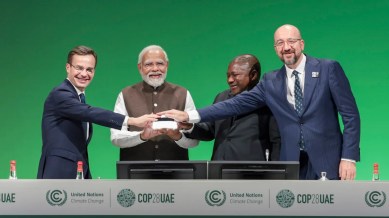Stay updated with the latest - Click here to follow us on Instagram
COP28: Pact elusive amid deep divisions over fossil fuel phase-out
Saudi Arabia leads fight to keep it out, gets support from India and China

Climate change conferences are quite used to stalemates, especially in the final days, and a familiar one existed at the Dubai Expo Centre, the venue of COP28, on Tuesday, as the conference went into extra-time. But never has the division been so sharp, the gap seemingly so unbridgeable. On the issue of fossil fuel phase-out, almost every country has a strong opinion, with no meeting ground currently in sight.
Yet, an agreement was being drafted, for all to agree on, because a COP has to have an outcome decision. A previous draft, that came Monday evening, had made everyone unhappy and was immediately rejected by many. A new one, possibly the final, is being worked upon and expected to be finalised in the early hours of Wednesday.
monthly limit of free stories.
with an Express account.
There are countries like Saudi Arabia that have made it clear that they would not agree to a fossil fuel phase-out in the final decision of the COP28 climate meeting. There are others like the European Union who insist that any decision that does not mention fossil fuel phase-out would be unacceptable. Then there are climate groups, activists and observers who have declared that COP28 would be a failure if it did not call for a fossil fuel phase-out.
At this point, no one is expecting any “ambition” in the new one — provisions strong enough to galvanise greater climate action, which is what the ask from this meeting was. The question only is whether there are adequate face-savers for everyone.
To be sure, fossil fuel phase-out is not the only point of contention. There are a whole range of issues, most of them old, some new, over which countries have strong disagreements. But it is quite evident now that COP28 would be judged largely on what it delivers on this single issue. Not without reason.
The issue of a phase-out of fossil fuels, and the way it has been dealt with by countries over the years, broadly sums up the global response to climate change so far.
Fossil fuels — oil, natural gas, coal and their derivatives – contribute about 80 per cent of all greenhouse gas emissions, and yet, have never found any mention in the hundreds of decisions that COPs have produced in the last three decades. The Paris Agreement, for example, seeks to restrict global rise in temperatures to well within 2 degrees Celsius from pre-industrial times, and calls upon countries to reduce their greenhouse gas emissions, but is totally silent on fossil fuels.
In fact, this was the argument used by Saudi Arabia, speaking on behalf of the Arab group on Monday night at a meeting called by COP28 hosts UAE following the uproar caused by the previous draft agreement text.
Preserve Paris (Agreement), don’t cherry pick from it or distort it, Saudi Arabia is learnt to have said, adding that there was no science that said fossil fuels needed to be eliminated to achieve the 1.5 degree Celsius target.
Saudi Arabia is right in the sense that the reports of the Intergovernmental Panel on Climate Change (IPCC), the most comprehensive and authoritative scientific information on the subject, do not explicitly mention the necessity of a fossil fuel phase-out.
But the same IPCC does say that a minimum 43 per cent reduction in greenhouse gas emissions by 2030 from 2019 was a pre-requisite to keep alive hopes of achieving the 1.5 degree target. There is no scenario in which this 43 per cent cut in emissions can be made without a rapid reduction in fossil fuel use.
This attempt to focus on emission cuts without tackling the sources of emissions has not worked out well till now. Annual global emissions are still on the rise, and so are production and consumption of fossil fuels.
COP28 was meant to provide a course correction in this regard, with a decision that asked countries to phase out fossil fuels. But the resistance has been stiff. Saudi Arabia might be leading the fight, but it is certainly not alone.
It has the backing of large number of countries whose economies are heavily dependent on either production or consumption of fossil fuels.
Besides its partners in the Arab Group, it received open support from the Like Minded Developing Countries (LMDC) group, of which India and China are a part.
India can live with the fossil fuel phase-out provision as long as this does not apply to everyone. The international climate change architecture makes a distinction between the developed and developing countries, with the developed world mandated to take the lead role in all climate actions. This principle is enshrined in all the COP agreements but was not clearly mentioned in Monday’s draft text.: